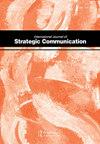CEO as “Chief Crisis Officer” under COVID-19: A Content Analysis of CEO Open Letters Using Structural Topic Modeling
IF 1.9
Q1 COMMUNICATION
International Journal of Strategic Communication
Pub Date : 2022-05-27
DOI:10.1080/1553118X.2022.2045297
引用次数: 1
Abstract
ABSTRACT This study seeks to explore how business leaders should respond to COVID-19. In advancing theoretical development of strategic crisis communication, we incorporated theoretical frameworks of organizational resilience, social support, and values-centered communication to make sense of CEO’s COVID-19 responses. Using structural topic modeling, this study analyzed 192 CEO open letters from 152 multinational corporations that are listed on the 2020 Fortune Magazine’s World’s Most Admired Companies. Fourteen valid topics and four general themes were identified and discussed. Results suggested that in those letters, CEOs demonstrated organizational resilience by giving sense to current crisis situations and expressing their self-efficacy and response efficacy in handling challenges, which supported the conceptualization and operationalization of organizational resilience in this new crisis context. Additionally, both emotional and instrumental support provisions were found in CEOs’ letters. A values-centered and care ethics communication approach was widely taken in CEOs’ messages, highlighting the importance of social solidarity in facing a public health crisis. This study also explored how topic prevalence varied by business sectors and CEOs’ genders and associated with companies’ financial performance. These summarized communication strategies and narrative topics shed light on crisis communication practice and theory, especially in the context of a global public health crisis.COVID-19下CEO作为“首席危机官”:基于结构主题模型的CEO公开信内容分析
本研究旨在探讨企业领导者应如何应对COVID-19。在推进战略危机沟通理论发展的过程中,我们将组织弹性、社会支持和以价值观为中心的沟通理论框架纳入其中,以理解CEO的COVID-19应对措施。利用结构主题模型,本研究分析了入选《财富》杂志2020年全球最受尊敬公司榜单的152家跨国公司的192封CEO公开信。确定并讨论了14个有效主题和4个一般主题。结果表明,在这些信件中,ceo们通过对当前危机形势的理解和应对挑战的自我效能和反应效能来展示组织弹性,这支持了新危机背景下组织弹性的概念化和可操作性。此外,在ceo的信中也发现了情感和工具支持条款。在首席执行官的信息中广泛采用了以价值观为中心和关怀伦理的沟通方法,强调了社会团结在面对公共卫生危机中的重要性。本研究还探讨了话题流行度如何随业务部门和ceo性别的变化以及与公司财务绩效的关系。这些总结的传播策略和叙事主题阐明了危机传播的实践和理论,特别是在全球公共卫生危机的背景下。
本文章由计算机程序翻译,如有差异,请以英文原文为准。
求助全文
约1分钟内获得全文
求助全文
来源期刊

International Journal of Strategic Communication
Social Sciences-Sociology and Political Science
CiteScore
3.40
自引率
0.00%
发文量
39
期刊介绍:
The International Journal of Strategic Communication examines the philosophical, theoretical, and applied nature of strategic communication, which is “the purposeful use of communication by an organization to fulfill its mission.” IJSC provides a foundation for the study of strategic communication from diverse disciplines, including corporate and managerial communication, organizational communication, public relations, marketing communication, advertising, political and health communication, social marketing, international relations, public diplomacy, and other specialized communication areas. The IJSC is the singular forum for multidisciplinary inquiry of this nature.
 求助内容:
求助内容: 应助结果提醒方式:
应助结果提醒方式:


